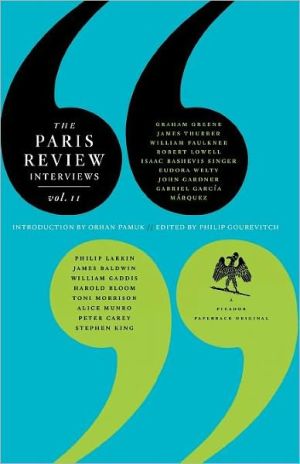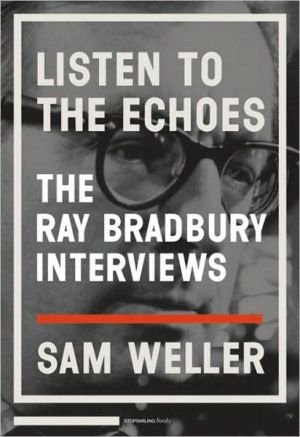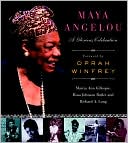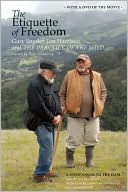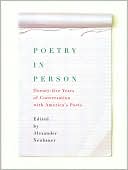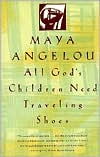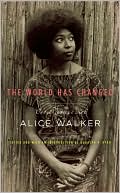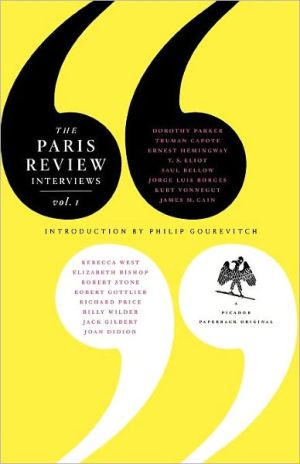Paris Review Interviews, Vol. II
Since The Paris Review was founded in 1953, it has given us invaluable conversations with the greatest writers of our age, vivid self-portraits that are themselves works of finely crafted literature. From William Faulkner's determination that a great novel takes "ninety-nine percent talent . . . ninety-nine percent discipline . . . ninety-nine percent work," to Gabriel García Márquez's observation that "in the first paragraph, you solve most of the problems with your book," The Paris Review...
Search in google:
Since The Paris Review was founded in 1953, it has given us invaluable conversations with the greatest writers of our age, vivid self-portraits that are themselves works of finely crafted literature. From William Faulkner's determination that a great novel takes "ninety-nine percent talent . . . ninety-nine percent discipline . . . ninety-nine percent work," to Gabriel García Márquez's observation that "in the first paragraph, you solve most of the problems with your book," The Paris Review has elicited revelatory and revealing thoughts from our most accomplished novelists, poets, and playwrights. With an introduction by Orhan Pamuk, this volume brings together another rich, varied crop of literary voices, including Toni Morrison, Isaac Bashevis Singer, Graham Greene, James Baldwin, Stephen King, Philip Larkin, Eudora Welty, and more. "A colossal literary event," as Gary Shteyngart put it, The Paris Review Interviews, II, is an indispensable treasury of wisdom from the world's literary masters.The Barnes & Noble ReviewPity the young writer looking for advice today -- where to begin amid the sea of anecdote and legend? Jonathan Franzen concluded The Corrections by writing blindfolded. Hemingway typed standing up. John Updike keeps a 1,000-word-a-day regime. Doris Lessing solves plot problems in her sleep. Margaret Atwood writes most of her poems on the back of envelopes and stationery. Jack Kerouac did headstands to get the blood flowing. Voltaire wrote Candide in three days.
\ Richard Eder"Now a second set of 16 is out, not quite up to the first. There are a number of lovely performances, and a somewhat greater proportion of duller ones. I use "performance" deliberately, trying to figure what it is that makes a half-dozen pieces work especially well, and others not."\ —The New York Times\ \ \ \ \ School Library JournalAdult/High School\ The 16 author interviews in this volume were originally conducted between 1953 and 2006. During these exchanges, some taking more than a day, established authors shared their writing styles and habits; their successes and failures; details about the characters, settings, and plots in their stories; and offered practical advice for beginning writers. William Faulkner, Eudora Welty, John Gardner, and Toni Morrison are among those who shared their thoughts. Young adults will appreciate the details included: Stephen King washed motel linens to support his family while beginning his writing career and James Baldwin delivered sermons as a preacher for three of his teenage years. The book also includes actual manuscripts of the featured authors and brief biographies. Like The Paris Review Interviews, I (Picador, 2006), it is a fascinating read either for pleasure or for research.\ —Gregory LumCopyright 2006 Reed Business Information.\ \ \ \ The Barnes & Noble ReviewPity the young writer looking for advice today -- where to begin amid the sea of anecdote and legend? Jonathan Franzen concluded The Corrections by writing blindfolded. Hemingway typed standing up. John Updike keeps a 1,000-word-a-day regime. Doris Lessing solves plot problems in her sleep. Margaret Atwood writes most of her poems on the back of envelopes and stationery. Jack Kerouac did headstands to get the blood flowing. Voltaire wrote Candide in three days. If a writer were to try and mix and match from this assembly of methods, she'd probably slip a disk and wind up -- like Proust -- writing in bed. So what to do with all this lore? Why collect it? The answer lies in the nature of the task. Writing, like painting or composing music, is a performance art that must be performed in solitude. For every writer you see hugging a bench at your local coffee shop, there are hundreds at home, hunched over their keyboards and flickering screens, figuring out -- as the title of Franzen's recent essay collection suggests -- how to be alone. \ There is no better guide to the rigors of this task than The Paris Review Interviews, which recently released its second volume, edited by the magazine's editor, Philip Gourevitch. Here are Gabriel Garc?a M?rquez, William Faulkner, and Toni Morrison pushing back the velvet curtain of art to talk about the habits and hopes behind their grandest creations. Give it to an aspiring writer and you may provide a near-religious experience. As Nobel laureate Orhan Pamuk writes in his introduction: "When I first read Faulkner in the Paris Review, in Istanbul, in 1977, I felt as elated as if I had stumbled on a sacred text."\ The scripture here is starchy stuff -- time and again writers remind us how hard it is to do what they do, how much pain they go through, how little feedback counts. "So you never feel the need to discuss your work with anyone?" one interviewer asks of Faulkner. "No, I am too busy writing it," he says. Some of this is writerly bravado -- but not all of the writers interviewed here possess it. James Baldwin freely admits failure was helpful to him. Philip Larkin, that poet of wry certainty, needed some reassurance from time to time. As does Peter Carey, who still faces the page every day with some terror, two Booker Prizes not withstanding: "It's like standing at the edge of a cliff," he says.\ There's pleasure here beyond such instruction: It shouldn't be a surprise that great writers are often great talkers. They can control the conversation, just as they do the page, livening up potentially boring questions with responses that cut to the heart of the matter. Morrison on what makes writing about sex so bad: "There is just too much information." Robert Lowell on whether he revises: "Endlessly." Stephen King on fear: "What are we afraid of, as humans? Chaos."\ They are also, frequently, very funny. Philip Larkin, a lifelong librarian and exurbanite, described meeting W. H. Auden. "I remember he said, Do you like living in Hull? And I said, I don't suppose I'm unhappier there than I should be anywhere else. To which he replied, Naughty, naughty." Harold Bloom gets naughty about John Updike: "Mr. Updike and I, we are not a mutual admiration society." Peter Carey describes how his best education as a writer came through the reading he did while working at a Melbourne advertising agency: "Graham Greene and Jack Kerouac and William Faulkner, week after week.... No Australian authors, because I thought they were worthless -- that's good colonial self-hatred."\ There are currents running through these conversations that make these interviews a fascinating record of a literary society's constant evolution. John Crowe Ransom, the poet-critic more and more forgotten each day, was a powerful orienting point for many writers in the '50s and '60s -- as John Updike is today. To Faulkner and Eudora Welty, their lighthouse was not a critic but fellow short story writer Anton Chekhov. For Alice Munro, it was Welty and her southern compatriots: "[T]hey showed me that you could write about small towns, rural people." For Marquez, it is Faulkner: "Only a technique like Faulkner's could have enabled me to write down what I was seeing."\ Uncluttered by "lifestyle" reporting, these answers stand out on the page like sacred stones. The Paris Review's interviewing style is typically self-effacing, shading toward the documentarian -- the interviewer is all but offstage, nudging from the side. Set questions appear and reappear, provoking different answers: Do you think about your audience? Do you work regular hours? What is the function of the critic? Do you ever write under the influence of drugs?\ Occasionally, though, an interviewer oversteps, and the results are equally fascinating. Two insinuating young men annoy Graham Greene so much that he simply takes a phone call and the conversation is over. William Gaddis is badgered by an interviewer whose questions are sometimes longer than his answers. "Maybe in ten years, when I am finished," he finally says about labeling his own work, "I will give you an answer for that."\ It is probably the truest reply in the entire book. Because as close as these interviews bring us to the so-called writing process, they never fully close the gap between what the writers says and what he or she accomplishes on the page. Nor should they. Fiction and poetry require an abiding mystery to maintain their power over us. It is what inspires and sustains, what makes us readers. Asked whether she felt like William Faulkner had made Mississippi his and his alone, Eudora Welty responded: "It was like living near a big mountain, something majestic -- it made me happy to know it was there." Among other things, this book is a fabulous reminder that there are other ranges out there, waiting to be climbed. --John Freeman\ John Freeman is president of the National Book Critics Circle. He is writing a book on the tyranny of email for Scribner.\ \ \
